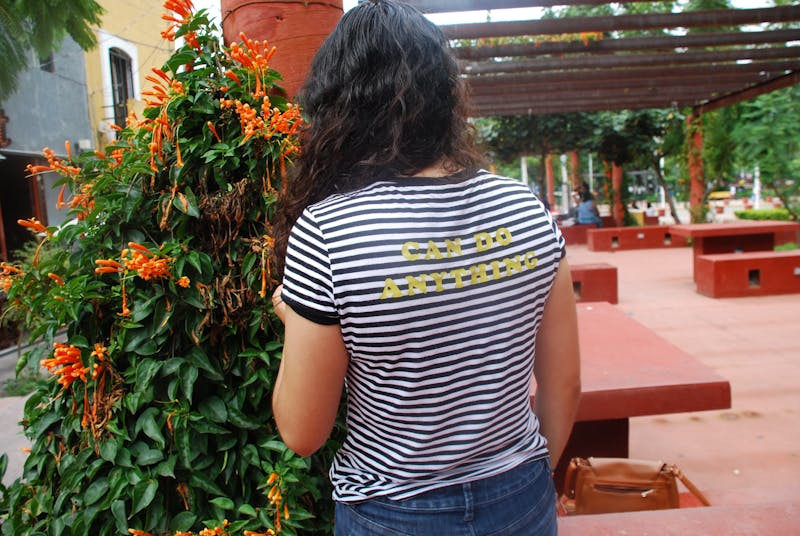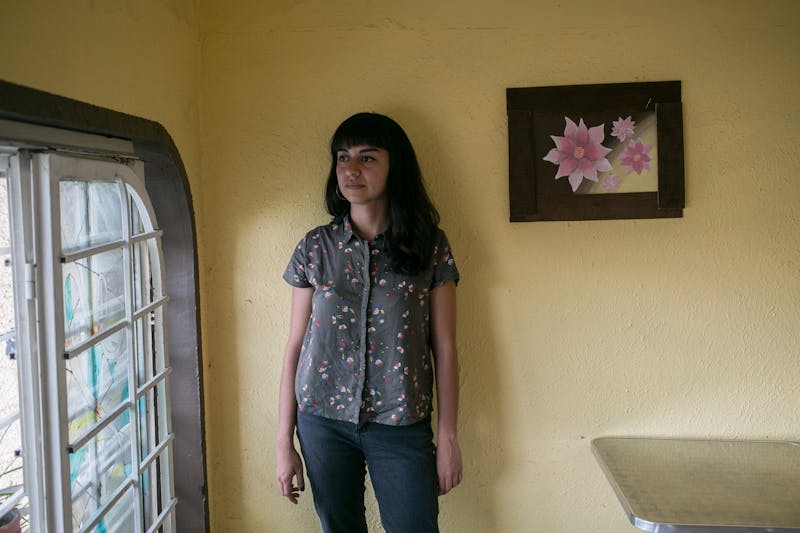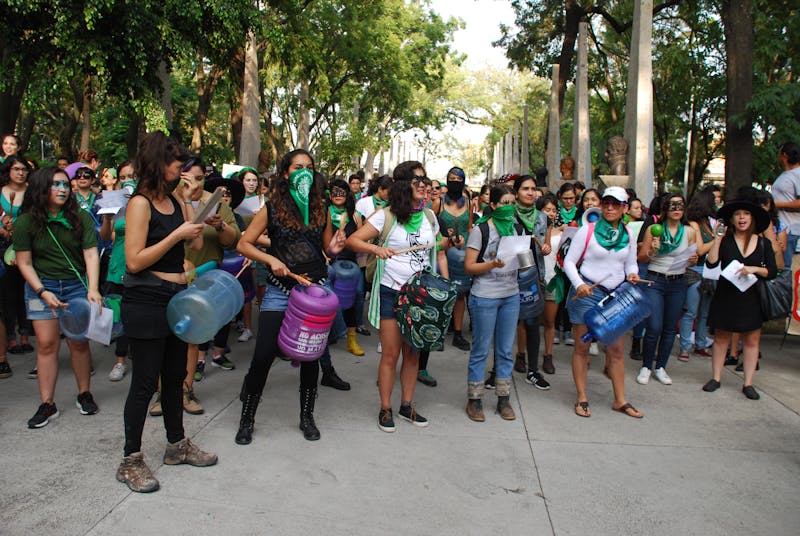Lizy and the woman who helped her to end her pregnancy met at a Starbucks in León, the largest city in the central Mexican state of Guanajuato. Then a 20-year-old social-work student with curly hair and a heart-shaped face, Lizy, which is a nickname we’ve used to help protect her identity, felt nervous about discussing her pregnancy in such a public place. She was afraid she could be jailed for even considering an abortion, which is a crime in most cases in the heavily Catholic and conservative state. Enrolled in an exchange program in a city where she knew few people, she had no way to make the hours-long trip to Mexico City, the only place where abortion was legal at the time. She and her partner felt hopeless. “We were dying from fear, really, we were two frightened children,” she said later, seated in a park in her home city of Guadalajara. Finally, she had confided in a professor who told her about Rosalía.
Rosalía Cruz Sánchez had chosen the location for the meeting. Her organization, Las Libres, favors in-person meetings in public settings as a way to show people that abortion is normal and should be discussed in the open. Lizy was grateful that Rosalía didn’t ask her to explain why she wanted an abortion; she only asked whether she had made her decision. Then in a quiet but clear voice, she explained how to take a regimen of misoprostol, an ulcer medication available over the counter in Mexico that is also part of the FDA-approved protocol for medication abortion used in the United States. “She told me: Here’s how to do it, and here’s my number; you can call me at one in the morning or two in the morning, and I’m going to listen to you,” Lizy remembered.
After buying the pills at Walmart, Lizy placed four of the chalky tablets under her tongue and began to bleed. She called Rosalía to give her an update. After the second dose, her symptoms increased: a feverish chill, vomiting, and diarrhea. Rosalía reassured her that this was normal. Finally, Lizy went to the bathroom and saw a little gray mass on her pad. She touched it and felt a wave of relief.

Las Libres is one of dozens of groups across Mexico that help people induce their own abortions. Some, including Las Libres, provide the pills directly when they can. Others offer instructions and around-the-clock counseling, fielding questions about how much bleeding is safe, how to dispose of pregnancy tissue, and, in rare cases of complications, how to speak to hospital staff without risking imprisonment. In their public life, these activists are students and newspaper editors, secretaries and teachers, office workers and doctors. The people they accompany are teenagers and college students, mothers and grandmothers, indigenous people and government officials. The activists use the word “accompaniment” to describe the work of being with people during an abortion—whether they are helping someone travel to Mexico City or texting with someone like Lizy in the middle of the night. This quiet and often clandestine work has not only helped countless people survive in a landscape of restricted access. It has also fueled a historic mobilization demanding the legalization of abortion in one of the world’s most Catholic countries. In a series of landmark victories for this “Green Tide” movement, the state of Oaxaca legalized abortion in September 2019, and the lower house of Congress recently passed federal legislation that could grant amnesty to women jailed for abortions.
Meanwhile, the U.S. has moved swiftly in the opposite direction. As states emboldened by the two Trump nominees on the Supreme Court have passed increasingly extreme restrictions, interest in self-managed abortion has surged. Even before President Trump’s election, grassroots groups in the U.S. quietly disseminated instructions and pills in states where laws have shuttered clinics and rendered abortion inaccessible for many people. As in Mexico, the work is legally risky in the U.S., where abortion-inducing medications are heavily regulated and advocates say at least 21 people have been arrested for self-induced abortions since 1973. The group Aid Access, which says it prescribed medication abortions over the internet to more than 7,000 women in the U.S. between March 2018 and August 2019, sued the Food and Drug Administration last year for seizing some of its shipments and blocking payments. In another case, a New York City woman who sold abortion pills was indicted on federal conspiracy and drug charges last year. As the burgeoning self-managed abortion movement here braces for a Supreme Court decision that could close even more clinics, U.S. activists are learning from their counterparts in Mexico and from the long history of self-managed abortion in Latin America.
Many sources trace the history of self-managed medication abortion to the 1980s in Brazil, when pharmacies began selling misoprostol with the warning that it could cause a miscarriage. It didn’t take long for women to figure out they could use the pills to induce abortions. Studies estimated that hundreds of thousands used the pills to circumvent the country’s abortion ban before Brazil restricted sales in 1991. Still, the underground use of misoprostol to self-induce abortions spread throughout Latin America and the Caribbean, where more than 97 percent of reproductive-age women live in countries with restrictive abortion laws.
In the Mexican state of Guanajuato, Las Libres never intended to become Mexico’s most high-profile and brazen accompaniment group. In 2000, Verónica Cruz, the founder of Las Libres, and a handful of her friends started talking about creating a feminist organization that would offer sexual education. “We wanted to create a small organization, nothing scandalous,” Cruz said. She and the other initial members of Las Libres had all engaged in activism and feminist work for years. Cruz, an energetic woman with a warm smile and a commanding presence, began her political organizing in elementary school, when she mobilized her classmates to stage plays to raise money for poorer children.
But their plans changed when Guanajuato state lawmakers tried to revoke rape survivors’ right to an abortion—which is the only exception to abortion bans recognized by all Mexican states. “We said, ‘They are crazy! We’re not going to allow this,’” Cruz explained. The idea of a small and low-profile organization was dashed; Las Libres rapidly mobilized massive protests that attracted international media attention and helped force the governor to veto the anti-abortion legislation.
But, in Mexico—as in the U.S.—there’s often a wide gap between reproductive rights under the law and actual access to abortion, particularly in highly conservative states like Guanajuato. So, Las Libres’ members began knocking on the doors of medical offices to find doctors willing to carry out the procedure. Their aim: to ensure that every person in the state who sought an abortion under the rape exception could, in fact, obtain one. One of the doctors they met was a gynecologist, who said she would not only perform the abortions herself, but that she would also show Las Libres members how to induce an abortion with misoprostol on their own.
As the news of the group’s activities spread, women flocked to Las Libres’ office asking for help accessing an abortion. “I remember one woman who arrived and asked, ‘Is this the clinic?’ And we were like, ‘What clinic?’” said Rosalía Cruz Sánchez.
Some of these women who came to Las Libres had been raped, but many wanted to end pregnancies for other reasons. “We said to ourselves, ‘It’s logical that if the medicine works for rape victims, it must also work for women who are not victims of rape, right?’” recounted Cruz. That’s when they started offering abortion accompaniment to everyone.
Since then, Las Libres estimates it has helped 10,000 women, some of whose numbers are saved on Rosalía Cruz Sánchez’s cell phone under names like “Acompañamiento 567,” the Spanish word for accompaniment. The group has continued to work in public, even as many Mexican states sought to further restrict abortion access as part of a backlash that followed Mexico City’s decision to legalize abortion in 2007. “People always ask me, ‘Aren’t you worried that your telephone is tapped?’ And I say, ‘Of course my phone is tapped—and isn’t it great that whoever is listening is learning about medical abortions?’” joked Verónica Cruz.
Despite its public profile, or perhaps because of the protection afforded by it, Las Libres has never been targeted by law enforcement. It argues that providing publicly available information about misoprostol to people who manage their own abortions is not illegal. But Las Libres is well acquainted with the Mexican justice system. Over the years, it’s helped free multiple women who were jailed on suspicion of having an abortion. “We’re the organization that best knows how to defend women who have been criminalized,” said Cruz. “And for that reason, we know how to beat the system.” In fact, Cruz said the group would welcome a legal case against it because that would allow it to mount an argument that could lead to the decriminalization of abortion across Mexico. “We have our legal strategy prepared to go all the way to the Supreme Court,” she said.
Many of Mexico’s accompaniment groups, however, operate in the shadows. (For that reason, we’ve withheld last names or used pseudonyms upon request.) Sofía, a philosophy student in her early twenties in Aguascalientes, is part of an anonymous online team that supports four or five women through their abortions every single day across Mexico and other parts of Latin America. She joined after the group’s founder—who had started by simply offering advice to her close friends—found herself so inundated with requests that she needed help. Sofía says the goal is to offer support to low-income women who cannot afford to travel to Mexico City for an abortion and may be forced to resort to unsafe measures. “The refrain that’s often repeated in Mexico is that the rich girls get abortions and the poor girls die,” she said. Members of the team have received rape and death threats and take care to conceal their identities. “We know that what we do makes a lot of people uncomfortable, and this puts us in danger,” she said.
Fernanda, a secretary who runs a website that sells abortion pills, also keeps her identity hidden as she counsels people through their at-home abortions and ships misoprostol pills across the country concealed inside magazines and newspapers as if they were ordinary documents. Over a decade ago, she had an unwanted pregnancy during college and struggled to find a source for the pills that she felt confident was safe. A few months after her self-induced abortion, a friend needed one too. “I told her what my experience was like and where I got the medication,” Fernanda recalled. “And from there the word spread, first to another friend, then to the friend of a friend, then to a cousin, and a neighbor. The news traveled quite fast.”
Misoprostol is widely available over the counter in Mexico. It’s usually sold in 28-pill packages, which is typically enough to end multiple pregnancies. “This is how some of the first accompaniment networks were formed: Women passed the pills between each other,” said Verónica Cruz. Yet with an average of one person reported to authorities every day for the crime of abortion in Mexico, many people eschew pharmacies and opt for street markets or websites instead. In Guadalajara, for example, a former car salesman named Lalo hawks exorbitantly priced misoprostol in an area well known for clandestine drug sales. Some peddlers charge even more, he adds, because they know women will pay. The problem with the black market, however, is that you never quite know what you’ll get. An advertising agency assistant named Lorena says she once paid a website $70 for eight pills that ended up being confectioners’ sugar. The black market for surgical abortions, meanwhile, can be more dangerous. Another woman, named Magda, says she once fled an illegal clinic after the doctor told her boyfriend that Magda might bleed to death during the procedure: “My boyfriend felt like the doctor had said, ‘Well, she could die, but nothing’s going to happen to me.’”

With appropriate support and information, however, experts say that self-managed medication abortions are extremely safe. And for some of the women who undergo them, the process can be a transformative experience that spurs them to activism. Ana Mares, a 27-year-old social worker, was raised by a catechist mother and grew up believing that abortion was the worst of all sins. But when Mares became pregnant as a university student, she knew she wasn’t ready to have a child. She searched online for help but instead ended up at the offices of an anti-choice group, whose members refused to let her leave the building until she threatened to call the police. She later bought abortion pills at a street market. “Instead of blaming myself and feeling like a victim,” she said, “I realized that these types of things happen, and will continue happening, precisely because women are second-class citizens, because they control our bodies, and because religion is in Mexico and our culture down to our veins.” Mares joined a feminist organization and graduated with a degree in social work. She now works with accompaniment groups to offer psychological and emotional support to people during their own extra-legal abortions.
It’s this type of political shift that Las Libres seeks to inspire during accompaniments. The activists always ask women two questions: whether they are sure they want an abortion and what they think of abortion. The latter offers Las Libres members an opportunity to try to dispel the procedure’s deeply ingrained religious and social stigma. “We want every woman we accompany to mobilize for the decriminalization of abortion for everyone,” said Verónica Cruz. That’s because abortion accompaniment groups, no matter how successful, are not a replacement for legalized abortion across Mexico and Latin America. “We can accompany five or ten thousand women. But in every country, there are at least four hundred or five hundred or nine hundred thousand abortions each year,” she said. “We’re never going to reach that.”

Months after her abortion, Lizy joined a group of hundreds of women wearing green handkerchiefs and T-shirts who filled the streets of Guadalajara to demand legalization of abortion. She gripped a banner that read, “Sister, get angry!” as they marched. “I don’t want other women to go through what I went through,” she said. Even though her abortion itself was successful, afterward she had bleeding and cramps for weeks but was too afraid to go to a doctor. Even with Rosalía’s support, the fear was still there. “I want there to be comprehensive medical care; I want it to be legal and for us not to be criminalized, so we’re not afraid to go to a gynecologist and worry we could end up in jail.”
Several weeks after the march, the feminist collective Lizy had joined put out a call for help with an unexpected request for accompaniment. An uninsured woman living in Texas needed an abortion, and she was having trouble accessing one. Lizy was surprised to learn that in Texas, where a medication abortion cost hundreds of dollars, a state law required most patients to have an ultrasound 24 hours before the procedure, during which a provider had to make any fetal cardiac activity audible and display and describe the image. “I read that abortion is legal in the United States, but I didn’t know there were these kinds of restrictions,” Lizy said. “It’s like it’s not actually legal at all.”
This reporting was supported by the International Women’s Media Foundation as part of the Adelante Latin American Reporting Initiative.
